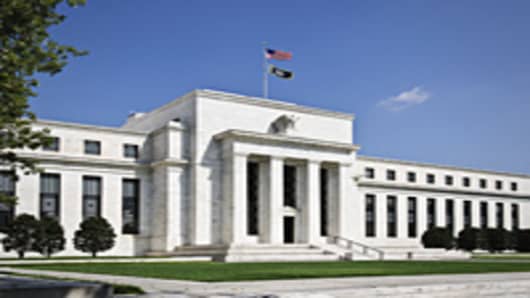With the threat of failure to reach a debt deal finally out of the way and the worsening global macroeconomic picture gripping investors, it has been a win- win for US Treasurys so far.
Yields fell to 2.4 percent this week – their lowest since late last year – and could fall further as fears of a double dip recession take hold in the U.S. and the euro zone shows an inability to grapple with its spiraling debt crisis, prompting investors to seek out safe havens.
Before the deal was finally agreed to raise the country's debt ceiling, a number of experts warned that the fractious negotiations between lawmakers thrashing out a deal had called into question the viability of the safe haven status of U.S. Treasurys and the dollar.
Other analysts feel the yield on the 10-year treasury is of less importance than the dollar and the U.S.' ability to retain its coveted triple-A credit rating.
Eric Wand, Rates strategist, Lloyds Bank Corporate Markets said even with a downgrade it would be a long time before the U.S. could lose its reserve status, largely because no credible alternative exists.
“If the US was downgraded – and we don’t know what the S&P are going to do yet – Treasurys will still be in demand, even without the triple AAA rating it’s still the most liquid bond market out there," he said.
“Yields are pushed down because even though we got a debt deal I still think the package wasn’t sufficient and the macro picture is increasingly getting worse.
There’s a reasonable probability that in the next three months there will be a U.S. downgrade but the effect would be only marginal,” he added.
Fitch and Moody's have kept the US' credit rating at AAA but with a negative outlook, S&P has yet to announce a review to its credit rating of the U.S. Earlier this week Chinese credit rating agency Dagong lowered its rating of U.S sovereign debt to A from A+ with a negative outlook.
Domenico Crapanzo, Head of European Rates Sales and Trading at MD. Jefferies & Co, said a downgrade to the US' triple-A rating was still possible.
"The imbalance in markets is more about the dollar but I think the safe haven status stays. Although the chance of a US downgrade is still high the impact will be felt on the dollar, and the subsequent affect on its status as the world's reserve currency." "Look at other major currencies, the Japanese yen, this is why they are doing so well," he said.
Another analyst told CNBC that Treasurys were now amongst the riskiest assets on the planet.
Don Amstad, Director of Asian Fixed Income at Aberdeen Asset Management, told CNBC, "I'm afraid Fitch and Moody's haven't exactly covered themselves in glory by maintaining the triple A rating. U.S. Treasurys, euro zone government bonds, JGBs, they're low yielding, denominated in currencies that are set to depreciate, they're probably the riskiest assets on the planet today."
How true that last sentiment is depends largely on whether the latest global economic worries are deep rooted or a delayed market reaction to concerns which have been around for some time, which only time will tell.


